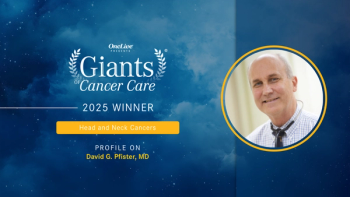
Practical Considerations for Managing RR DTC With Systemic Therapy
Comprehensive insight on best practices in dose adjustment and adverse event management in patients receiving systemic therapy for RR DTC.
Episodes in this series

Transcript:
Lori J. Wirth, MD: Marcia, from a philosophical point of view, I have to admit I’m glad that every once in a while studies don’t turn out as we hoped or expected, so that we remind ourselves that we do need to do these studies and get the data before knowing for sure what the best approach is.
Marcia S. Brose, MD, PhD: I was wrong on all 3, I helped design that trial, and I was like, oh, that’s going to be….
Lori J. Wirth, MD: From the philosophical point of view again, it’s great for our humility to be wrong every once in a while.
Marcia S. Brose, MD, PhD: Yes.
Lori J. Wirth, MD: I’d love to hear your thoughts and impressions on the case, both Frank and Ezra. Frank, why don’t you go first, and also mention what you do with your starting dose when you’re starting patients on lenvatinib.
Francis P. Worden, MD: I think Marcia raises a really good point here, in particular with this patient because she’s symptomatic, she has a large burden of disease, and we need to reduce that. I will confess, once in a while I will start at a lower dose for someone I think is not as fit. But in someone like this, for sure, I will start at 24 mg, because the data show that you get the best response with lenvatinib. So that’s the agent I would have chosen as well. I totally agree with her on that. Additionally, I like the fact that she referred somebody to cardiology or has a hypertension clinic, because we do the same thing at [University of] Michigan [Rogel Cancer Center]. We have a hypertensive group that will follow about a third of our patients, like hers. And I like that you chose lisinopril as your first agent, because not only hypertension but also proteinuria is an issue with these people. ACE [angiotensin-converting enzyme] inhibitors are good for our patients with diabetes for preventing proteinuria, so that is extremely helpful. That’s what I would have done. And the amlodipine has as a different mechanism, so I think that was a great choice as well, though you have to watch for the swelling or edema you can get with amlodipine eventually. If someone gets proteinuria, it can be an issue as well, or as Marcia talked about, sarcopenia and your protein levels going down. That would be important to note.
Then in terms of following and adjusting the dose as needed, I thought that was appropriate. Then I too often will give holidays, just like Marcia does, a week off, and then they come back and sometimes they level out, as she says. They can come back to their 14 mg a day, and they’re doing just fine. It’s important for us to make sure we’re checking the blood pressure, checking their overall nutritional status, their weight. Weight loss can happen with lenvatinib long term, leading to those other issues. Then periodically checking their urine to make sure they’re not spilling protein there, as well. Nice job, Marcia.
Marcia S. Brose, MD, PhD: I give Lori the credit for lisinopril, because years and years ago, she talked about making that her first choice for blood pressure, and I adopted it then and never looked back.
Lori J. Wirth, MD: Ah, Marcia.
Marcia S. Brose, MD, PhD: I give credit where credit is due.
Lori J. Wirth, MD: Thank you, that’s very sweet. Ezra, what do you think about that? Because I think it’s a great, typical case that we see, with a good response, which is not at all unexpected, and a durable response, which is not at all unexpected with lenvatinib.
Ezra Cohen, MD, FRCPSC, FASCO: Thanks Lori and Marcia, really nice case, thanks for presenting it. It’s an interesting case, and I think there are a few other points that are worth bringing up. First of all, this is clearly an aggressive disease right from the onset. That’s a bit atypical for, I think Marcia, you said the histology was papillary.…
Marcia S. Brose, MD, PhD: It’s poorly differentiated with an HRAS mutation.
Ezra Cohen, MD, FRCPSC, FASCO: She had an HRAS, so, a bit atypical that way, because as we mentioned at the beginning, many thyroid cancers present with local or locoregional disease and then develop radioactive iodine-resistant or metastatic disease, for many of them years down the road. She clearly is going to behave differently; this is an aggressive cancer that is going to need to be managed very closely. One thing it does illustrate is the timing of systemic therapy. This is a patient who I think all of us would agree required systemic therapy when you instituted it. Not all patients are like that, and we have to keep that in mind. That’s one thing I would bring up. The next is, it’s interesting that she had renal cell carcinoma, and I can’t remember how old you said she was, but obviously, I’m sure you took a complete oncologic and family history.
Marcia S. Brose, MD, PhD: Yes.
Ezra Cohen, MD, FRCPSC, FASCO: But when I see 2 simultaneous cancers like this, and both of them are not the most common cancers in the world, I begin to think about germline testing and the utility of that. Although there aren’t clearly defined hereditary syndromes associated with poorly differentiated [cancer]. There are some associated with papillary, but it’s something to think about, and germline testing, of course, is now generally available.
Marcia S. Brose, MD, PhD: She was 50, just to answer your question, and she did have testing. It was negative. You have to wonder whether there’s a gene out there we just don’t know about yet.
Ezra Cohen, MD, FRCPSC, FASCO: I’m sure there’s a gene out there we don’t know about. I remember, even the largest panels cover now I think about 150, 155 genes. Clearly, that’s a small fraction of the hereditary syndromes that we’re going to discover in our practice lifetime. That was point No. 2. Point No. 3 is, I do what you do. I start at 24 mg and then titrate down, watch them very closely, especially for the first few months of therapy, remembering that hypertension tends to occur early, we see that in the first few weeks. I tell patients probably the same things that you do. Get a blood pressure cuff, monitor it every day. I teach them how to take their blood pressure properly because most people do not know how to do that. I tell them to keep a diary every day. I give them the parameters on which to call us if it goes above this number or that number, and of course, we have to remember that those numbers depend on their baseline blood pressure. It’s not the same for every patient. I tell them that, I give them all the instructions, I see them in 2 weeks, just to look at that log and make sure their blood pressure in the office isn’t 200 mm Hg systolic, and their blood pressure cuff is recording a 100 and something. That hypertension occurs early, and it’s got to be managed very closely.
But we also recognize, and I tell patients this, and I think it’s important to tell patients this, that the other adverse effects are not going to occur right away, and Marcia, your patient illustrated that perfectly. She didn’t have the GI [gastrointestinal] adverse effects I think until you said 12 weeks into therapy, which is really not atypical. So patients can think, “I am doing great on 24 mg, I’m 4 weeks into therapy, I feel terrific,” and then all of a sudden all these symptoms come, and they think the boat is capsizing and everything is going wrong. So I tell them to anticipate that, we’ll watch you, we know these things take time to happen, and we can manage them. The only exception I have with starting at 24 mg is, I think Frank you alluded to it, for very elderly patients or frail patients, I will start low, and I will work my way up. Just because I fear that even minor adverse events in those patients are going to tip the scales and not allow me to continue therapy. I’m talking about the 80-year-olds, the 90-year-olds with significant other comorbidities….
Marcia S. Brose, MD, PhD: Who are also 80 or 90 pounds?
Ezra Cohen, MD, FRCPSC, FASCO: Exactly. The performance status is borderline. But those clearly don’t constitute, at least not the majority in my practice. I would say the great majority of patients I start at 24 mg, and then work my way down.
Marcia S. Brose, MD, PhD: This woman was a surprise for me because she had no blood pressure issues before she started. She was not somebody I was worried about and expecting this to go quite so ballistic. But somebody who is already on 2 or 3 blood pressure medicines, that’s another person I might start lower because I don’t have room to go.
Ezra Cohen, MD, FRCPSC, FASCO: Marcia you bring up a great point that I think we have to alert the viewers to, that patients with a history of hypertension, especially essential hypertension, are much more prone to rises in blood pressure that may be more difficult to control. That doesn’t say that patients without a history of hypertension will not have blood pressure issues, but it’s good to be aware of that.
Francis P. Worden, MD: The other point I’d like to bring up about that is, patients will come in with blood pressures that aren’t so well controlled. In the studies when we did them, we couldn’t start until the blood pressure, the reading was declared by the sponsor. And I think that’s important because, in the real world, it’s easy for us to say, “Oh, you have thyroid cancer and a big mass. We need to start you,” without paying attention to that. So, as Ezra said about the viewers, I would make sure that the blood pressure is controlled because you are going to run into problems, just like Marcia said, if you don’t. The other point I’d bring up too about the diarrhea is if I find they are refractory to Imodium, I will use Lomotil or even a tincture of opium. Being a former pharmacist, I love a tincture of opium. No one else does, but I do.
Lori J. Wirth, MD: I just like the way it sounds.
Francis P. Worden, MD: Just because your point is really well taken that your absorption is so altered with that. That’s something to pay attention to because some people are refractory to Imodium.
Ezra Cohen, MD, FRCPSC, FASCO: The other thing, Frank, that I forgot to say about the diarrhea is that I have them see our dietitian, and you’d be amazed how some changes in diet, especially adding bulk, avoiding certain foods, and a good diet history make a difference to these patients. So I have almost all of my patients who develop diarrhea, which is also going to be a lot of patients on this drug, see our dietitian, and I’ve found them to be incredibly helpful.
Marcia S. Brose, MD, PhD: We tell our patients to go on a low-fiber diet because the fiber is usually the thing that tips them over.
Ezra Cohen, MD, FRCPSC, FASCO: It’s the type of bulk that’s in the diet, it’s not just fiber or no fiber. It’s really interesting, it’s….
Marcia S. Brose, MD, PhD: More complicated than that.
Francis P. Worden, MD: One more point about that is that I’ve seen a patient or two go to a family doctor who says, “We’ll put you on cholestyramine” because it’s a thickening agent. We’ve got to be really careful with that drug because that will bind every drug that you take up, and you will get no delivery. So, if you’re going to use that drug, you need to make sure you’re spacing it out appropriately.
Lori J. Wirth, MD: This has been a really great discussion on lenvatinib and dealing with the adverse effects the patient experiences, and now I can’t resist making a comment myself about this. I do think it’s important because of the complexity of treating patients that we do most of our adverse effect management ourselves in our oncology clinic, rather than rely on the primary care physicians because they don’t know. I think the tendency sometimes is to let the primary care physicians deal with the hypertension. And in this particular situation, the onus is on us to take care of these patients well.
Transcript edited for clarity.



































